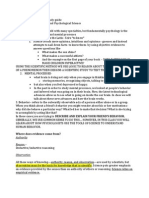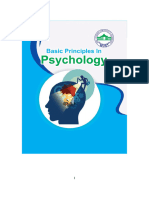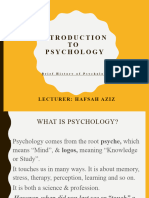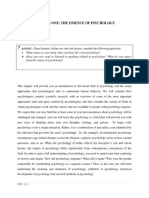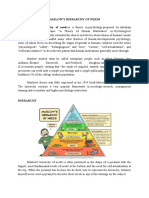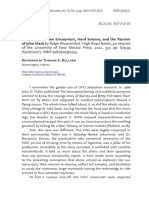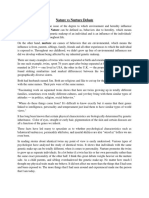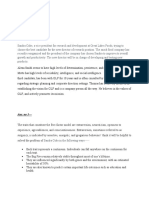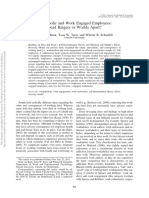Keywords:
PSYCHOLOGY, BEHAVIOR, STUDENT, PSYCHOLOGIST, FOCUS, CHAPTER, RESEARCH, PRINCIPLE,
KNOWLEDGE.
Digest:
Preface
One of the most fundamental integrating principles of the discipline of psychology is its focus on
behavior, and yet that is often not made clear to students.
The idea of empirical research testing falsifiablehypotheses and explaining much (but never all)
behavior-the idea of psychology as a science-was critical, and it helped me differentiate psychology from
other disciplines
My focus on behavior, coupled with a consistent focus on empiricism, helped in this regard-focusing on
these themes helped me identify the under lying principles of psychology and separate more essential
topics from essessential ones.
Approach and Pedagogy
I wrote this book to help students organize their thinking about psychology at a conceptual level. Five or
ten years from now, I do not expect my students to remember the details of most of whatI teach them.
However, I do hope that they will remember that psychology matters because it helps us understand
behavior and that our knowledge of psychology is based on empirical study.This book isdesigned to
facilitate these learning outcomes. I have used three techniques to help focus students on behavior :
1.Chapter openers
I begin my focus on behavior by opening each chapter with a chapter opener show casing an interesting
real-world example of people who are dealing with behavioral questions and who can use psychology to
help them answer those questions.The opener is designed to draw the student into the chapter and
create an interest in learning about the topic.
2..Psychology in everyday life
Each chapter contains one or two features designed to linkthe principles from the chapter to real-world
applications in business, environment,health,law,learning,and other relevant domains.
Forinstance,theapplicationinChapter6 "Growing and Developing"-"What Makes a Good Parent?"-applies
the concepts ofparenting styles in a mini handbook about parenting, and the application in Chapter
�3"Brains, Bodies, and Behavior" is about the difficulties that left-handed people face performing
everyday tasks in aright-handed world.
3. Research focus
This feature providesa continuous thread that reminds students of the importance of empirical research.
My focus on behavior and empiricism has produced atextthatis better organized,has fewer chapters,and
is some what shorter than many of the leading books.`In short, I think that this book will provide a useful
and productive synthesis between your goals andthe goals of your students.I have tried to focus on the
forest rather than the trees and to bring psychology to life-in ways that really matter-for the students.
And many people have direct knowledge about psychology because they have visited psychologists,
forinstance, school counselors, family therapists, and religious, marriage, or bereavement counselors.
Chapter 1 : Introducing Psychology
Psychology is scientific study of mind and behavior. Because we are frequently exposed to the work of
psychologists in our everyday lives, we all have an idea about what psychology is and what psychology is
do. In many ways I'am sure that your conceptions are correct.
Most psychologists work in research laboratories, hospitals, and other field settings where theystudy the
behavior of humans and animals.
This chapter provides an introduction to the broad field of psychology and the many approaches that
psychologists take to understanding human behavior.
Research psychologists use scientific methods to create new knowledge about the causes of behavior,
whereas psychologist-practitioners, such as clinical, counseling, industrial-organizational, and school
psychologists,use existing research to enhance the everyday life of others.
Psychology as a science
Why psychologist rely on empirical methods
Levels of Explanation in Psychology
The Challenges of studying Psychology
















